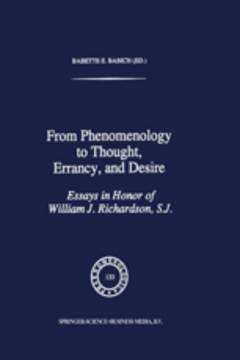Surplus being
the Kantian legacy
pp. 71-87
Abstract
Kant's Copernican Revolution ushers in a modem view of being. The subjectivity of the subject becomes, in Kant's words, the condition of the objectivity of the object. A consequence of this reversal is that the subjectivity of the transcendental imagination, as analysed in the first edition of the Critique of Pure Reason, is hailed as the common source of both our sensible and our intelligible knowledge of things. The ontological implications of this position are concisely stated in Kant's bold maxim that "being is not a real predicate." My opening chapter offers a critical reading of this Kantian thesis and explores its legacy in subsequent phenomenological interpretations by Brentano, Husserl, and, most especially, Heidegger.
Publication details
Published in:
Babich Babette (1995) From phenomenology to thought, errancy, and desire: Essays in honor of William J. Richardson, S.J.. Dordrecht, Springer.
Pages: 71-87
DOI: 10.1007/978-94-017-1624-6_5
Full citation:
Kearney Richard (1995) „Surplus being: the Kantian legacy“, In: B. Babich (ed.), From phenomenology to thought, errancy, and desire, Dordrecht, Springer, 71–87.


